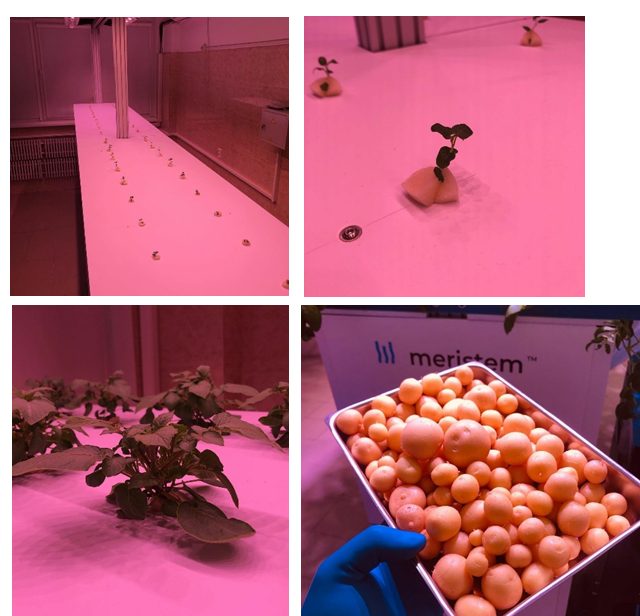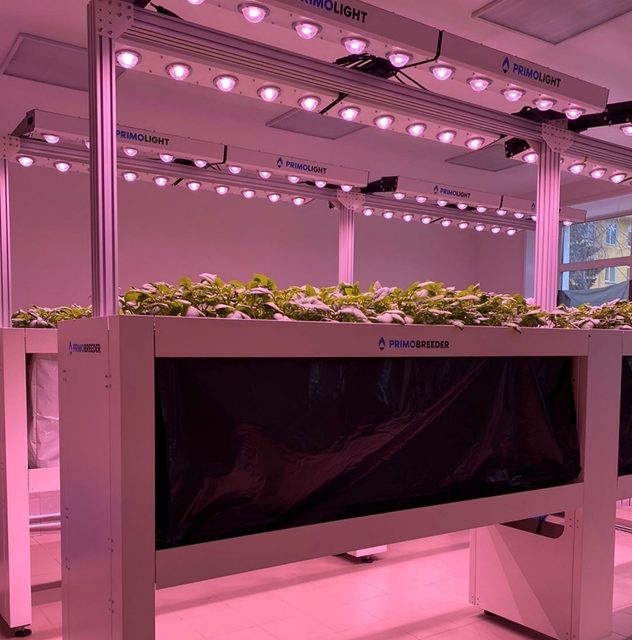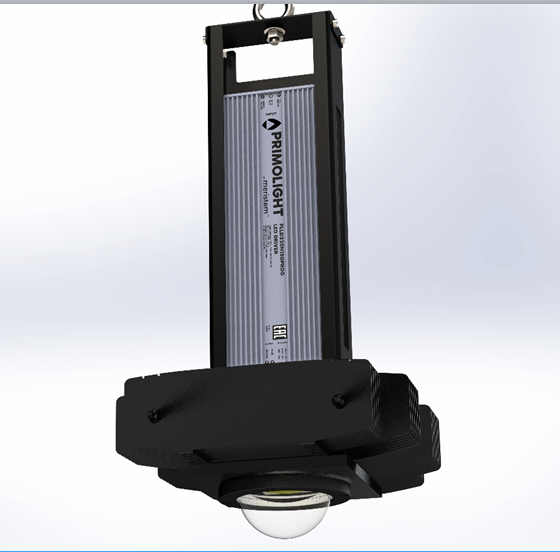MERISTEM PLATFORM – development of technology for the production of primary virus-free potato material in an isolated environment for the purposes of original seed production and accelerated breeding.
The project is aimed at developing a technological line of specialized equipment (PRIMOBREEDER aero-hydroponic module, PRIMOLIGHT lighting devices, PRIMOSEED seed and planting material preparation machines), a set of agrotechnological techniques, software (PRIMOCORE), which together allow the production of virus-free primary potato seed material for original seed production and accelerated selection:
- with a maximum reproduction rate (minimum 30 mini-tubers per plant in-vitro, which is 4.3-6 times higher than with the traditional pot growing method).
- wide possibilities of implemented tasks. The technology will allow for at least 3 cultivation cycles per calendar year.
- ease of maintenance. The automation rate is 90% of all growing processes.
- the shortest possible implementation period (Launch of the production cycle).
- low production costs.
A PROTOTYPE of the aero-hydroponic module PRIMOBREEDER AERO LAB 40 has been developed, intended for growing mini-tubers of potatoes from in-vitro plants under phytotron conditions. EAC documents for the main components of the system have been received.
•Registered PRIMOCORE LAB software – designed to manage system parameters.
•Pre-production prototypes have been released.
•Operational debugging of the structure and its elements is carried out.
•Research is being carried out in cultivation technology on domestic varieties.
•Using the developed solutions, the maximum multiplication coefficient of 100 mini-tubers of the established criterion per plant was obtained on the domestic variety Legend.
The market for imported seed potatoes is dominated by products from Germany, Belarus and the Netherlands. Large volumes are also imported from Poland, the United Kingdom, Finland and France. In 2021, the share of the TOP 10 foreign manufacturing companies (if we do not take into account supplies from the EAEU countries) accounted for 92.2% of all volumes, in January-May 2022 – 96.8%.

The seed potato market in Russia is characterized by high import dependence on foreign suppliers.
In 2021, compared to 2020, the volume of imports of seed potatoes into the Russian Federation increased by 88.5%.
Deliveries from all countries amounted to 17.4 thousand tons.

Description of the problem
In the subprogram “Development of selection and seed production of potatoes in the Russian Federation” of the Federal Scientific and Technical Program for the Development of Agriculture for 2017 – 2025 (Resolution of the Government of the Russian Federation of August 25, 2017 N 996), the main problems of Russian potato growing enterprises were noted:

- outdated material and technical base of most potato breeding and seed-growing institutions
- lack of modern infrastructure and outdated material and technical base of organizations involved in potato selection and seed production
- the low quality of the produced seed potatoes of the selected varieties are the main reasons why the majority of new domestic potato varieties remain unclaimed in the domestic and foreign markets
The project allows us to solve one of the most pressing problems of today, put on the agenda within the framework of the state scientific and technical program for potato seed selection: to replace imported seed material to the maximum and strengthen domestic developments by moving to a qualitatively new technological level.
General description of the project
- The technology will allow for an accelerated assessment of the potential of numbered hybrids in the breeding process, as well as perform many functional operations related to the original seed production and breeding process, including hybridization and clonal selection.
- The currently used system for the production of primary seed material (minitubers) of potatoes has disadvantages: the growing cycle is carried out in one revolution once a year, it is necessary to build a greenhouse, the multiplication rate is small (5-7 tubers per plant in-vitro), the presence of soil increases risks of infection, a lot of manual and mechanized labor.
- Upon full implementation of the design work, a new production system will be created, including technological units and production technology: minimizing manual labor as much as possible, increasing the reproduction rate (minimum 30 mini-tubers per plant in-vitro), with a minimal risk of infection, and having a clear payback cycle and the cost of the material produced. The technology will allow for at least 3 cultivation cycles per calendar year.
Dynamics of project development to date
Проведены и проводятся в настоящий момент НИОКР в области выращивания мини-клубней картофеля методом аэро-гидропоники на отечественных селекционных достижениях
2017 – Beginning to explore the research direction;
2018 – Construction of the first samples: light emitters, prototypes of aerohydroponic modules;
2019 – Work on the physical properties of the aerosol medium and methods of its organization
2020 – Construction of the first prototypes of aerohydroponic modules
2021 – Launch of a research laboratory
2024 – Receipt of documents, entry into the market of the first prototypes
Current status of the project
The technological chain of equipment and its interaction systems allow the production of primary virus-free potato material in an isolated environment for the purposes of original seed production and support of breeding processes.

- A link has been developed – a PROTOTYPE of the aero-hydroponic module PRIMOBREEDER AERO LAB 40, designed for growing mini-tubers of potatoes from in-vitro plants under phytotron conditions. (There is an application for a utility model).
- Received EAC documents for the main components of the system.
- Registered PRIMOCORE LAB software – designed to manage system parameters.
- Pre-production samples released..
- Operational debugging of the structure and its elements is carried out.
- Research is being carried out in cultivation technology on domestic varieties.
The existing design of the prototype aero-hydroponic module allows for the cultivation of potato mini-tubers, with a coefficient of 50 to 500 mini-tubers per plant in-vitro. The data is confirmed by articles of the Higher Attestation Commission, written in collaboration with URFANITS Ural Branch of the Russian Academy of Sciences. The structures work in the selection and technological center in the field of potato growing in the branch of the Ural Research Institute of Agriculture – URFANITS Ural Branch of the Russian Academy of Sciences. Cooperation is underway with scientific centers in the Russian Federation to jointly work on elements of the technology.
PRIMOCORE software
The PRIMOCORE software is intended for use as a central control system for devices of the PRIMO line, with the possibility of remote monitoring and control in an automated mode.
PRIMOCORE receives and analyzes data from connected equipment.
The overall goal is that sensor data, combined with the knowledge of a qualified technician, can help improve productivity as well as reduce costs.
This data can be used to automate methods for conducting the breeding process, making informed decisions to improve quality and minimize risks.
Also, this software will improve incident management and coordination of emergency response, quality of service, uptime, and reduce operating costs in all areas related to infrastructure.
Main features:
•Power management of connected devices.
•Monitoring the status of connected devices.
•Receiving data from digital and analog sensors.
•Event logging.
•Incident notifications.
•Scheduling the execution of algorithms.
Product innovation
SCIENTIFICALLY BASED
the spectral composition and power of the light link provides a multiplication factor of at least 30 minitubers per plant on any selection achievement (variety).
MAINTENANCE-FRIENDLY DESIGN
equipment and growth capacity (filing a patent application). The equipment sanitation cycle takes no more than 1 hour, with minimal manual labor. The containers allow you to maintain the required temperature and humidity parameters in the root zone. The design of the growth container provides maximum isolation between technological growing cycles from solutions available on the market.
FOOD INCLUDED
stock (concentrated) nutrient solutions – (patent filing). Using the developed solutions, the maximum multiplication coefficient of 500 minitubers per plant was obtained on the domestic variety Legend.
MAXIMUM AUTOMATION
The automation rate is 90% of all growing processes, using proprietary software. The developed software supports management of up to 40 I/O devices, with the ability to further expand this number.
Development prospects

Plan for the development of a technological line for the purposes of original seed production and selection:
PRODUCTION of primary seed material in phytotrons, using substrate-free technology, all year round, using light culture conditions.
TECHNOLOGY of growing plants in-vitro in incubators.
SORTING material according to characteristics (size, shortcomings, possible problems) using machines with artificial intelligence.
ISOLATED hybridization.
GROWING seedlings using automatic planting lines and material marking.
ASSESSMENT of identity (clonal selection) and potential using artificial intelligence.
Commercialization plan
Consumer needs:
- In standardized technology, with a set of equipment that allows you to quickly deploy year-round production of primary virus-free potato seed material.
- Existing solutions on the market are hydroponic equipment placed in summer greenhouses and the production technology requires improvement, and also has the disadvantage of an increased risk of contamination of the material with bacterial diseases.
- The consumer prefers technologies that work in modern agriculture, which minimize manual labor and, accordingly, reduce production costs.
Market size
According to open data, the Potato Union of the Russian Federation at the end of 2022 consisted of 98 professional participants. All companies involved in selection and seed production are showing interest in the technology being developed, and some of them, in the process of analyzing preliminary interest, expressed their readiness to enter into a contract for the supply of pre-production samples.
In addition, in the Russian Federation, most of the enterprises that are participants in the seed production market, i.e. who are the originators, but are not members of the Potato Union.
According to preliminary estimates, the market in the Russian Federation for the next 3 years will be about 600 million rubles, and given the maximum ease of implementation of the technology at the enterprise, during the development of the project the team expects to attract the widest interest and demand for the project’s products.
After analyzing foreign markets, we can conclude that only one technology of aerohydroponic production is currently the subject of scientific competition – there are no finished products (technology elements) on the market, and technologies working in large companies are a trade secret. Therefore, the product produced by our project has potential abroad.







